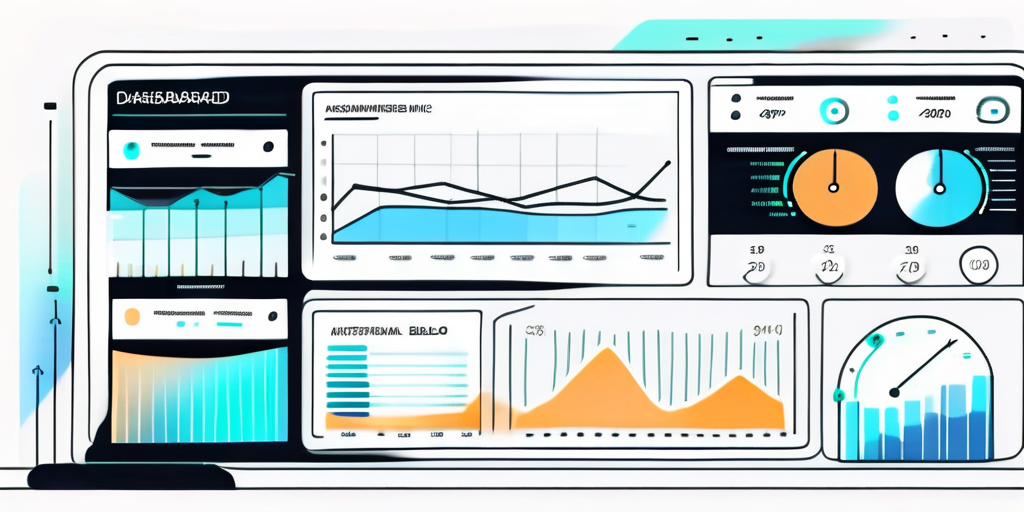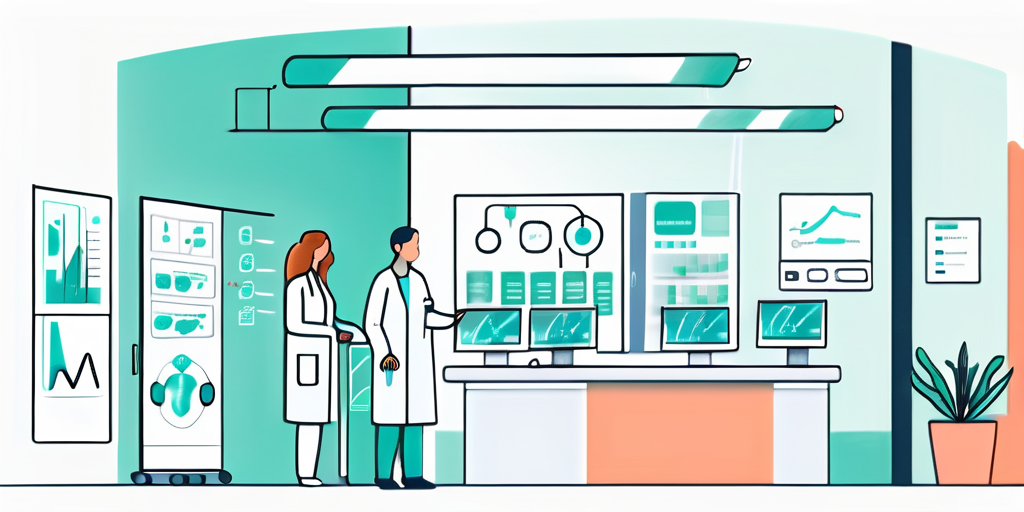In today’s rapidly advancing digital landscape, the implementation of artificial intelligence (AI) has revolutionized various industries, including healthcare. AI-driven solutions are transforming clinic workflows, streamlining processes, and enhancing patient care. Understanding the role of AI in healthcare is crucial for clinics to stay ahead in this technological era.
Understanding the Role of AI in Healthcare
AI has witnessed a remarkable rise in modern medicine, revolutionizing the way healthcare providers deliver services. With the ability to analyze vast amounts of data quickly and accurately, AI algorithms can make predictions, identify patterns, and provide valuable insights that enable healthcare professionals to make informed decisions.
The Rise of AI in Modern Medicine
The past decade has witnessed a significant surge in the adoption of AI technologies in healthcare. According to a report by Accenture, the AI healthcare market is projected to reach a value of $6.6 billion by 2025, growing at a compound annual growth rate (CAGR) of 44.9%. This indicates the immense potential and the rising demand for AI-driven solutions in clinics across the globe.
Key Benefits of AI in Healthcare
The integration of AI into clinic workflows offers numerous benefits. First and foremost, AI-powered solutions can automate repetitive and administrative tasks, reducing manual effort and time-consuming activities. This, in turn, enables healthcare professionals to focus more on direct patient care, improving overall patient outcomes. Furthermore, AI algorithms can analyze large volumes of patient data, such as medical records, test results, and genetic information, to identify potential risks, make accurate diagnoses, and develop personalized treatment plans. This not only enhances efficiency but also increases the accuracy of medical decision-making.
Moreover, the role of AI in healthcare extends beyond clinical settings. In research and development, AI algorithms can analyze vast datasets from clinical trials and scientific literature to identify potential drug targets and accelerate the discovery of new treatments. This has the potential to revolutionize the pharmaceutical industry, speeding up the development of life-saving drugs and therapies.
Additionally, AI plays a vital role in promoting preventive healthcare. By leveraging predictive analytics, AI-driven solutions can identify at-risk patient populations and recommend proactive interventions, thereby preventing emergencies and reducing healthcare costs. Furthermore, AI technologies enable real-time monitoring of patients, allowing healthcare professionals to remotely track vital signs, detect anomalies, and intervene promptly in critical situations. This remote monitoring capability has proven especially valuable during the ongoing COVID-19 pandemic, enabling healthcare providers to care for patients while minimizing the risk of exposure.
The Need for Streamlined Workflows in Clinics
Clinics are dynamic environments that require efficient and streamlined workflows to ensure optimal patient care. However, current clinic workflows often face numerous challenges that hinder their effectiveness. Recognizing these challenges is the first step towards implementing AI-driven solutions that can address them effectively.
Efficient workflows are crucial in clinics to maintain a high standard of patient care. With the advancement of technology, there is a growing need to integrate AI-driven solutions to streamline processes and improve overall efficiency. By embracing these innovations, clinics can enhance their operational effectiveness and ultimately provide better healthcare services to their patients.
Challenges in Current Clinic Workflows
One of the major challenges faced by clinics is the burden of administrative tasks and paperwork. This not only consumes valuable time but also increases the risk of errors and delays in patient care. Another challenge is the complex process of patient scheduling, which often leads to long waiting times and dissatisfaction among patients. Additionally, the manual handling and analysis of medical records pose a significant challenge in terms of data accuracy and efficiency.
Moreover, the lack of interoperability between different healthcare systems and software used in clinics can create bottlenecks in information sharing and communication. This can result in fragmented care and hinder the continuity of treatment for patients. Addressing these interoperability issues is essential to ensure seamless coordination among healthcare providers and improve the overall quality of care delivery.
The Impact of Efficient Workflows on Patient Care
Efficient clinic workflows have a direct impact on patient care and outcomes. According to a study published in the Australian Journal of General Practice, optimized workflows significantly improve patient satisfaction and reduce waiting times. They also lead to increased staff productivity and reduced staff burnout. By adopting AI-driven solutions, clinics can streamline their workflows, maximize efficiency, and ultimately enhance the overall patient experience.
Exploring AI-Driven Solutions for Clinics
The application of AI in healthcare extends to various aspects of clinic workflows, offering innovative solutions to streamline operations and improve patient care.
AI in Patient Scheduling and Management
Patient scheduling is a critical component of clinic workflows. AI-enabled scheduling systems can optimize appointment slots, taking into account factors such as patient preferences, physician availability, and estimated appointment duration. This not only reduces waiting times but also minimizes the likelihood of scheduling conflicts and cancellations. AI algorithms can also send automated reminders to patients, reducing no-show rates and optimizing clinic resources.
Moreover, AI can analyse historical data to predict patient demand, allowing clinics to allocate resources efficiently and adjust staffing levels accordingly. By identifying patterns in appointment scheduling and patient flow, AI can help clinics anticipate busy periods and plan staffing rosters to ensure optimal patient care and operational efficiency.
AI in Medical Record Handling and Analysis
The handling and analysis of medical records can be time-consuming and prone to errors. AI-powered solutions can automate the extraction, coding, and analysis of medical records, enabling healthcare professionals to access patient information quickly and accurately. These solutions can also detect patterns and trends in patient data, facilitating data-driven decision-making and personalized care plans.
Furthermore, AI algorithms can assist in clinical decision support by analysing vast amounts of medical data to provide insights on potential diagnoses, treatment options, and patient outcomes. By integrating AI into medical record handling and analysis, clinics can enhance the quality of care provided to patients, improve diagnostic accuracy, and ultimately, save valuable time for healthcare professionals.
Steps to Implement AI in Clinic Workflows
Implementing AI-driven solutions in clinic workflows requires careful planning and consideration of various factors. Here are some essential steps to guide clinics through this transformative journey.
Assessing the Readiness of Your Clinic for AI Integration
Before embarking on the AI implementation journey, it is crucial to evaluate the readiness of your clinic’s infrastructure and stakeholders. This includes assessing the availability and quality of data, the technical capabilities of existing systems, and the willingness of staff to adapt to AI technologies. Engaging with a digital marketing agency focused on healthcare marketing can help clinics navigate this assessment process and identify areas that require attention.
Furthermore, it is important to involve key stakeholders such as healthcare providers, IT specialists, and administrative staff in the assessment process. Their input and insights can provide a comprehensive understanding of the clinic’s current state and help in developing a tailored AI integration strategy. Conducting workshops and training sessions to educate staff about the benefits of AI in healthcare can also foster a culture of innovation and collaboration within the clinic.
Choosing the Right AI Solution for Your Clinic
Selecting the appropriate AI solution for your clinic depends on several factors, including the specific needs of your workflows, the size of your practice, and your budgetary constraints. Collaborating with a digital marketing agency that specializes in healthcare marketing can provide valuable insights and expert guidance on choosing the most suitable AI solution for your clinic.
Moreover, conducting thorough research on different AI vendors and solutions in the market can help clinics make informed decisions. It is essential to consider factors such as the vendor’s reputation, the scalability of the AI solution, and the level of support and training provided. Additionally, seeking recommendations from other healthcare providers who have successfully implemented AI in their workflows can offer valuable perspectives and best practices to follow.
Overcoming Potential Obstacles in AI Implementation
While the integration of AI-driven solutions brings numerous advantages, there are potential obstacles that clinics need to address for successful implementation.
Addressing Concerns about AI in Healthcare
One of the primary concerns surrounding AI in healthcare is the fear of machines replacing human clinicians. However, it is important to emphasize that AI is designed to assist healthcare professionals, not replace them. AI complements human expertise by providing valuable insights and streamlining processes, enabling clinicians to deliver better patient care.
Ensuring Data Security and Patient Privacy with AI
AI implementation necessitates the handling of vast amounts of sensitive patient data. Therefore, clinics need to prioritize data security and patient privacy. Strict protocols, robust encryption methods, and compliant data storage practices must be implemented to safeguard patient information. Collaborating with a digital marketing agency experienced in healthcare marketing will ensure that clinics adhere to industry standards and regulations in data security and privacy.Expanding on the importance of data security, it is crucial for clinics to conduct regular audits and assessments to identify any vulnerabilities in their AI systems. By staying proactive and vigilant, clinics can stay ahead of potential security breaches and protect patient data from unauthorised access. Additionally, investing in staff training programmes on data security best practices will empower employees to handle sensitive information responsibly and mitigate risks effectively.Moreover, as AI continues to revolutionise the healthcare industry, clinics should also consider the ethical implications of AI implementation. Ensuring transparency in how AI algorithms are developed and used is essential to maintain trust with patients and uphold ethical standards. Collaborating with ethicists and legal experts can help clinics navigate the complex ethical landscape of AI in healthcare, ensuring that patient welfare remains at the forefront of decision-making processes.
Measuring the Success of AI-Driven Workflows
To evaluate the effectiveness of AI-driven workflows, clinics should track key performance indicators (KPIs) that reflect the impact of AI implementation on various aspects of clinic operations. By monitoring these metrics, clinics can gain insights into the benefits and areas for further improvement.
Key Performance Indicators for AI in Healthcare
KPIs such as reduced waiting times, decreased administrative burden, improved patient satisfaction scores, and enhanced staff productivity indicate the success of AI-driven workflows. These indicators provide a comprehensive overview of how AI is positively influencing clinic operations and patient care.
Reduced waiting times are a crucial KPI as they directly impact patient experience. With AI-driven workflows, clinics can optimize appointment scheduling, allocate resources efficiently, and minimize delays. This not only improves patient satisfaction but also ensures that healthcare providers can deliver timely and effective care.
Another important KPI is the decreased administrative burden. By automating routine administrative tasks, AI frees up valuable time for healthcare professionals to focus on patient care. This not only improves staff productivity but also reduces the risk of errors and improves overall operational efficiency.
Improved patient satisfaction scores are a key indicator of the success of AI-driven workflows. AI-powered chatbots and virtual assistants can provide patients with instant access to information, answer their queries, and offer personalized recommendations. This enhances the patient experience and ensures that they feel supported throughout their healthcare journey.
Enhanced staff productivity is a critical KPI that reflects the positive impact of AI on clinic operations. AI algorithms can analyze vast amounts of patient data, identify patterns, and provide healthcare professionals with valuable insights for diagnosis and treatment. This enables clinicians to make informed decisions quickly, leading to improved patient outcomes and increased staff efficiency.
The Future of AI-Driven Workflows in Clinics
As technology continues to evolve, the future of AI-driven workflows in clinics holds immense potential. Advancements in machine learning and predictive analytics are expected to further enhance the accuracy and efficiency of AI algorithms. The integration of AI with other emerging technologies, such as the Internet of Things (IoT) and telemedicine, holds the promise of creating a seamless, patient-centric healthcare ecosystem.
Imagine a future where AI-powered wearable devices continuously monitor patients’ health parameters and provide real-time updates to healthcare providers. This would enable early detection of potential health issues and proactive interventions, ultimately leading to better patient outcomes and reduced healthcare costs.
Furthermore, AI-driven workflows have the potential to revolutionize medical research and drug development. By analyzing vast amounts of medical literature and clinical trial data, AI algorithms can identify patterns and potential treatment options. This accelerates the discovery of new therapies and improves the efficiency of clinical trials, bringing innovative treatments to patients faster.
In conclusion, the implementation of AI-driven solutions offers significant benefits for streamlining clinic workflows and enhancing patient care. By understanding the role of AI, addressing challenges, and following the necessary steps, clinics can harness the power of AI to revolutionize their operations. Embracing AI-driven workflows not only positions clinics at the forefront of healthcare innovation but also ensures a brighter future for patient care.
Ready to elevate your clinic’s workflow with the cutting-edge power of AI? At Clinic Marketing AI, we blend the expertise of our CEO, Angelo Rosati, with the innovative spirit of health tech to offer you unparalleled service. We’re not just a service provider; we’re your partner in growth, committed to excellence in every aspect of our work. Don’t let your clinic fall behind in the healthcare revolution. Book a Call with Us today, and together, we’ll transform the future of Your Clinic.



